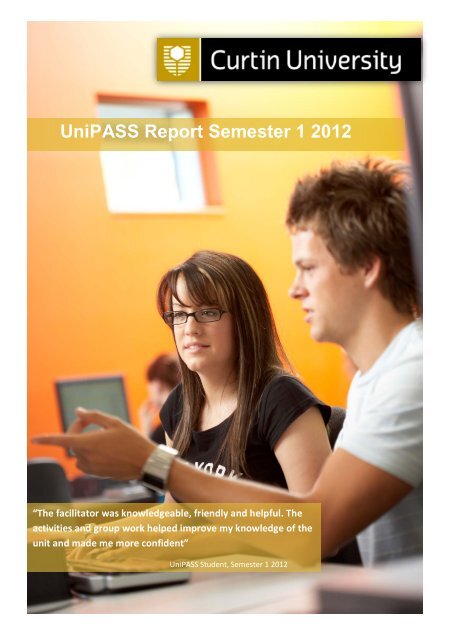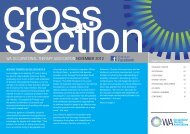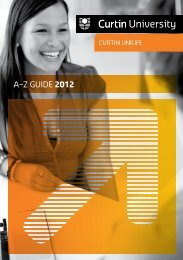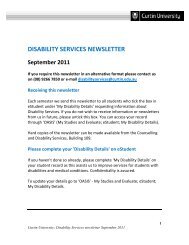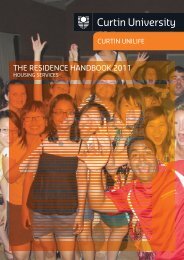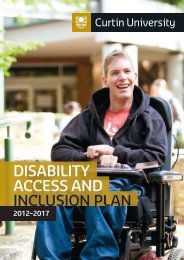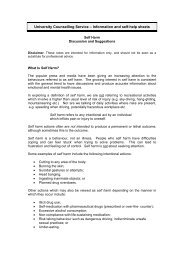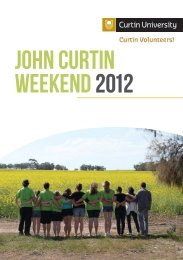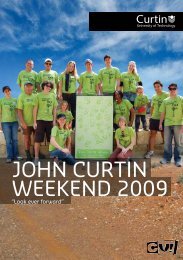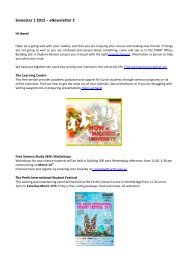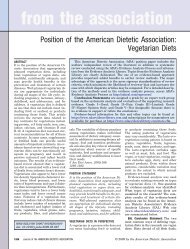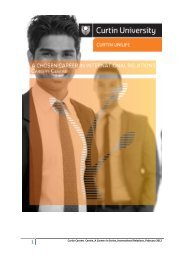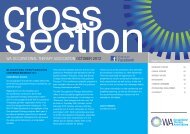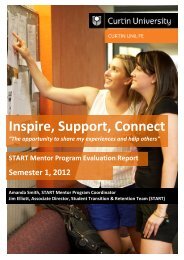UniPASS Report Semester 1 2012 - Unilife - Curtin University
UniPASS Report Semester 1 2012 - Unilife - Curtin University
UniPASS Report Semester 1 2012 - Unilife - Curtin University
Create successful ePaper yourself
Turn your PDF publications into a flip-book with our unique Google optimized e-Paper software.
<strong>UniPASS</strong> <strong>Report</strong> <strong>Semester</strong> 1 <strong>2012</strong><br />
“The facilitator was knowledgeable, friendly and helpful. The<br />
activities and group work helped improve my knowledge of the<br />
unit and made me more confident”<br />
<strong>UniPASS</strong> Student, <strong>Semester</strong> 1 <strong>2012</strong>
<strong>UniPASS</strong> <strong>Semester</strong> 1 <strong>2012</strong> <strong>Report</strong><br />
Contents<br />
Acknowledgements ..................................................................................................................................................... 2<br />
Executive Summary ..................................................................................................................................................... 3<br />
Summary of Recommendations .................................................................................................................................. 4<br />
Introduction ................................................................................................................................................................ 5<br />
<strong>UniPASS</strong> Results Overview ........................................................................................................................................... 6<br />
Benefits of the Program .............................................................................................................................................. 7<br />
Average Increase in Grades ..................................................................................................................................... 7<br />
Effect on Borderline Students .................................................................................................................................. 7<br />
Demographic of <strong>UniPASS</strong> Regular Attendees ........................................................................................................... 7<br />
Benefits to the Student Experience and <strong>Curtin</strong>’s Reputation .................................................................................... 8<br />
Attendance ................................................................................................................................................................. 8<br />
Promotion and Marketing ........................................................................................................................................... 9<br />
Feedback from Regular Attendees............................................................................................................................. 10<br />
Attendees Positive Comments ............................................................................................................................... 11<br />
Attendees Suggestions for Improvement ............................................................................................................... 11<br />
Feedback from Non-Attendees.................................................................................................................................. 12<br />
Feedback from Peer Learning Facilitators .................................................................................................................. 16<br />
Graduate Attributes .............................................................................................................................................. 18<br />
Feedback from Faculty Staff ...................................................................................................................................... 18<br />
HEPPP Targets ........................................................................................................................................................... 19<br />
Figure 11 ............................................................................................................................................................... 19<br />
Figure 12 ............................................................................................................................................................... 20<br />
Low Socio-Economic Status Students..................................................................................................................... 20<br />
Regional and Remote Students .............................................................................................................................. 20<br />
Centre for Aboriginal Studies ................................................................................................................................. 21<br />
Tertiary Education Quality Standards Agency (TEQSA)............................................................................................... 21<br />
Program Achievements to Date ................................................................................................................................. 23<br />
Conclusions and Recommendations .......................................................................................................................... 24<br />
Additional Information .............................................................................................................................................. 25<br />
References ................................................................................................................................................................ 25<br />
Raphael Pereira September <strong>2012</strong> UniLife – START – <strong>UniPASS</strong> 1
Acknowledgements<br />
<strong>UniPASS</strong> <strong>Semester</strong> 1 <strong>2012</strong> <strong>Report</strong><br />
It is important to acknowledge the immense contributions to the program by the Peer Learning Facilitators all of who<br />
give to the program much more than they take. We also acknowledge the various contributions from the START<br />
team and Dr Jim Elliott. Finally, this program would not have been so successful without the support of faculty staff<br />
and Unit Coordinators, including:<br />
Professor Clare Pollock, Amanda Jefferson, Gary Whittaker, Rayne Stradwick-Thompson, Jenny Dolzadelli, Professor<br />
Sue Trinidad, Dr Cathy Cupitt, Associate Professor Len Sparrow, Lara Mackintosh, Leonie Matthews, Dr Tanya Elliott,<br />
Dr Daniel Southam, Peter McKinnon, Dr Leslie Almberg, Dr Roger Mandel, Associate Professor Stacey Porter, Dr<br />
Rossie Kerr, Dr Mike Robey, Associate Professor John Venable, Bikram Chatterjee, Sheldon Smith, Sharon Woodfield,<br />
Geraldo Martinez, Peter Ridley and Maggie McAlinden.<br />
We also acknowledge that the <strong>UniPASS</strong> program is based on PASS from the <strong>University</strong> of Wollongong (Australasian<br />
PASS Training Centre) and Supplemental Instruction (International SI/PASS Training Centre) from the <strong>University</strong> of<br />
Missouri – Kansas City. PASS/SI are service marks of the <strong>University</strong> of Missouri-Kansas City.<br />
Finally, <strong>UniPASS</strong> currently operates on Whadjuk/Nyungar land at the Bentley Campus. We go forward with honour<br />
and respect, by acknowledging the Elders of Nyungar Nation past and present, their descendants and families,<br />
sovereign owners of Whadjuk country.<br />
<strong>UniPASS</strong> is supervised and coordinated by Raphael Pereira and Anna Neindorf.<br />
Raphael Pereira September <strong>2012</strong> UniLife – START – <strong>UniPASS</strong> 2
Executive Summary<br />
• Background<br />
<strong>UniPASS</strong> <strong>Semester</strong> 1 <strong>2012</strong> <strong>Report</strong><br />
◦ <strong>UniPASS</strong> is an academic support program that uses collaborative peer learning to achieve academic,<br />
transition, retention, student experience and regulatory outcomes.<br />
◦ <strong>UniPASS</strong> is an evidenced and nationally accredited academic support program.<br />
◦ In semester one <strong>2012</strong> <strong>UniPASS</strong> underwent a successful rapid expansion from 3 pilot units to 14 units<br />
across four faculties.<br />
• Benefits<br />
◦ An 11.7% average increase in the grades of regular attendees.<br />
◦ A reduction in the fail rate of regular attendees by 64%.<br />
◦ 20% of <strong>UniPASS</strong> students from HEPPP target groups.<br />
◦ Graduate attributes of facilitators are significantly extended and developed<br />
◦ <strong>UniPASS</strong> is a pathway into academia for facilitators.<br />
◦ <strong>UniPASS</strong> has a low impact on academic staff workload.<br />
◦ Assists meeting TEQSA requirements.<br />
◦ Assists meeting equity targets.<br />
• Challenges for <strong>UniPASS</strong> include:<br />
◦ Improving attendance levels in specific units.<br />
◦ Refining the marketing message to appeal to students more strongly.<br />
◦ Securing funding independent of HEPPP after 2013.<br />
◦ Maintaining the pedagogical integrity of the program by not becoming remedial or tutoring.<br />
• TEQSA<br />
◦ The dual influences of the Bradley Review with its focus on widening participation and the emergence of<br />
TEQSA as the national regulator gives increased value to <strong>UniPASS</strong>. By offering an evidenced and<br />
nationally accredited academic support program <strong>Curtin</strong> is strategically aiming to meet the diverse<br />
learning needs of its students (Tertiary Education Quality and Standards Agency Act 2011) (Review of<br />
Australian Higher Education (Executive Summary), 2008).<br />
• Funding<br />
◦ <strong>UniPASS</strong> requires committed fiscal resources to operate beyond 2013. By committing to the learning<br />
needs of an increasingly diverse student population with <strong>UniPASS</strong>, <strong>Curtin</strong> <strong>University</strong> will demonstrate its<br />
ability to improve academic outcomes, enhance the student experience and meet equity and regulatory<br />
obligations.<br />
Raphael Pereira September <strong>2012</strong> UniLife – START – <strong>UniPASS</strong> 3
<strong>UniPASS</strong> <strong>Semester</strong> 1 <strong>2012</strong> <strong>Report</strong><br />
Summary of Recommendations<br />
• Maintain the program at its current operational capacity and consolidate systems to improve upon current<br />
gains.<br />
• Commence discussions with relevant areas on funding arrangements post 2013.<br />
• Establish <strong>UniPASS</strong> at the Kalgoorlie Campus to provide an equitable student experience and improve learning<br />
outcomes for students transitioning to the Kalgoorlie campus.<br />
• Examination of the upcoming AIME program for Indigenous students to determine if a need still exists for<br />
<strong>UniPASS</strong> in CAS.<br />
• Continued development of <strong>UniPASS</strong> unit selection criteria which would list characteristics that units would<br />
ideally possess to be successful candidates for <strong>UniPASS</strong>. Such a profile would be most indicative after<br />
analysis of results and data from 2013.<br />
• Improving recruiting procedures by formally identifying the characteristics of our most successful facilitators.<br />
Enhancing the promotion related to recruitment to get a large pool of applicants. Continue to develop a<br />
commitment to recruit from <strong>UniPASS</strong> regular attendees to build on the culture of constructivist peer learning<br />
already established in the classroom.<br />
• Build links with similar programs within WA to develop a professional body of practice specific to the local<br />
context.<br />
• Continue to develop <strong>Curtin</strong>’s peer learning reputation at a national level.<br />
• Conduct research into attendance of voluntary support programs at <strong>Curtin</strong> <strong>University</strong>.<br />
• Examine the prospect of formal university recognition for <strong>UniPASS</strong> PLFs as the program develops desired<br />
graduate attributes.<br />
Raphael Pereira September <strong>2012</strong> UniLife – START – <strong>UniPASS</strong> 4
<strong>UniPASS</strong> <strong>Semester</strong> 1 <strong>2012</strong> <strong>Report</strong><br />
Introduction<br />
<strong>UniPASS</strong> was a peer learning program selected to strategically meet <strong>Curtin</strong> <strong>University</strong>’s student support and equity<br />
requirements under the Bradley Review (Review of Australian Higher Education (Executive Summary), 2008) (Student<br />
Equity Strategy 2010-2013, 2009). <strong>UniPASS</strong> was successfully piloted with one unit in semester 1 2011 then three<br />
units in semester two 2011. This report covers the expansion of <strong>UniPASS</strong> in semester 1 <strong>2012</strong> from three to 14 units.<br />
The expansion of the program to this level provided some challenges, namely: gaining sufficient attendance;<br />
obtaining support and building relationships with all faculties; recruiting, training and supervising 34 student<br />
facilitators; gathering appropriate reporting data; meeting HEPPP targets; commencing an online pilot for <strong>UniPASS</strong>.<br />
<strong>UniPASS</strong> is a nationally accredited peer learning programme (PASS- Guidelines for Best Practice, 2010) where weekly<br />
group study sessions are run by senior students. <strong>UniPASS</strong> has multiple benefits for learners. Apart from improving<br />
academic performance, study skills and social integration, its follow-on benefits are to improve student transition<br />
and retention. Also, due to its HEPPP (Higher Education Participation and Partnerships Program) funding<br />
arrangements the programme works to improve retention of low SES, regional, remote and Indigenous students<br />
(Student Equity Strategy 2010-2013, 2009).<br />
At its core, <strong>UniPASS</strong> uses peer to peer relationships in a collaborative learning environment to meet the above aims.<br />
The sessions provide a place where a trained senior student creates a non-hierarchical, non-threatening learning<br />
environment. The senior students are trained in facilitation techniques and do not re-teach content; instead they<br />
strive to enable students to become active, independent learners. <strong>UniPASS</strong> targets units that have a history of<br />
difficulty for students and not by targeting at-risk students directly. This enables <strong>UniPASS</strong> to be inclusive and<br />
voluntary, avoiding any remedial stigma so that students at varying levels of achievement can integrate and aspire to<br />
improve (PASS- Guidelines for Best Practice, 2010) (PASS – Accredited Supervisor Manual, <strong>2012</strong>).<br />
The <strong>UniPASS</strong> model has been adapted from Supplemental Instruction (SI), which was initially created by the<br />
<strong>University</strong> of Missouri-Kansas City (UMKC) in 1973 as a way of improving academic performance of medical students,<br />
and its Australian counterpart (PASS: Peer Assisted Study Sessions) from the <strong>University</strong> of Wollongong (UOW). This<br />
model has a strong history of research and evidence to support the positive effects on student learning (PASS –<br />
Accredited Supervisor Manual, <strong>2012</strong>).<br />
Raphael Pereira September <strong>2012</strong> UniLife – START – <strong>UniPASS</strong> 5
<strong>UniPASS</strong> Results Overview<br />
<strong>UniPASS</strong> <strong>Semester</strong> 1 <strong>2012</strong> <strong>Report</strong><br />
Figure 1: <strong>UniPASS</strong> Results Summary Table <strong>Semester</strong> 1 <strong>2012</strong> (actual unit identity available from supervisor)<br />
Unit<br />
<strong>UniPASS</strong><br />
Average<br />
Increase<br />
<strong>UniPASS</strong><br />
Regular<br />
Attendee<br />
Fail Rate<br />
Non-<br />
Attendees<br />
Fail Rate<br />
Difference<br />
in fail rate<br />
Regular<br />
Attendees<br />
who would<br />
have failed<br />
Percentage<br />
of Regular<br />
attendees<br />
who would<br />
have failed<br />
<strong>UniPASS</strong><br />
Regular<br />
Attendees<br />
Total<br />
<strong>UniPASS</strong><br />
Attendees<br />
Total<br />
Enrolled<br />
Student<br />
Cohort<br />
Regular<br />
Attendees<br />
as<br />
Percentage<br />
of Total<br />
Enrolments<br />
2 nd Year<br />
Accounting Unit<br />
2 nd Year<br />
Architecture<br />
Unit<br />
1 st Year Biology<br />
Unit<br />
1 st Year<br />
Chemistry A<br />
1 st Year<br />
Chemistry B<br />
1 st Year<br />
Humanities Unit<br />
1 st Year Geology<br />
Unit<br />
1 st Year Human<br />
Biology Unit<br />
1 st Year<br />
Anatomy Unit<br />
1 st Year<br />
Mathematics<br />
Unit<br />
1 st Year<br />
Programming<br />
Unit<br />
1 st Year<br />
Pharmacy Unit<br />
1 st Year Physics<br />
Unit<br />
18.03% 14.29% 42.49% 28.21% 2 28.57% 7 25 335 2.10%<br />
2.67% 0.00% 17.78% 17.78% 3 60.00% 5 19 107 4.67%<br />
12.50% 14.29% 30.67% 16.38% 1 7.14% 14 35 179 7.80%<br />
12.51% 0.00% 27.92% 27.92% 1 16.67% 6 21 259 2.32%<br />
18.51% 0.00% 26.40% 26.40% 0 0.00% 16 52 284 5.63%<br />
16.11% 25.00% 36.14% 11.14% 0 0.00% 4 18 100 4.00%<br />
13.66% 0.00% 30.00% 30.00% 4 44.44% 9 28 152 5.92%<br />
8.07% 3.64% 10.15% 6.51% 16 14.69% 110 263 1727 6.31%<br />
9.50% 0.00% 13.99% 13.99% 3 21.43% 14 36 176 7.96%<br />
9.87% 10.00% 28.78% 18.78% 4 40.00% 10 55 322 3.11%<br />
15.47% 28.57% 47.45% 18.87% 1 7.14% 14 35 168 8.33%<br />
4.19% 13.04% 21.33% 8.29% 11 47.83% 23 37 111 20.72%<br />
13.60% 0.00% 25.81% 25.81% 1 33.33% 3 13 130 2.31%<br />
2 nd Year<br />
Business IT Unit<br />
9.52% 38.10% 44.44% 6.35% 6 28.57% 21 40 100 21.00%<br />
<strong>UniPASS</strong><br />
Program 11.73% 10.49% 28.81% 18.32% 53 24.99% 256 677 5062 7.04%<br />
Average/Totals<br />
Notes on the table:<br />
• This data is descriptive and for indicative purposes only.<br />
• Regular Attendees: students who have attended 5 sessions or more.<br />
• <strong>UniPASS</strong> Average Increase: the average mark achieved by regular attendees compared to the unit average less<br />
<strong>UniPASS</strong> regular attendees Eg. <strong>UniPASS</strong> regular attendees average = 60%; Unit Average = 50%; so the <strong>UniPASS</strong><br />
difference = 10%.<br />
• Regular Attendees who would have failed: Are regular <strong>UniPASS</strong> attendees who between 50 – 61% so, assuming the<br />
<strong>UniPASS</strong> average increase in grades of 12%, would have possibly failed without <strong>UniPASS</strong>.<br />
• Percentage of Regular Attendees Who Would Have Failed: this indicates the proportion of at-risk students who were<br />
regular attendees which can account for a lower <strong>UniPASS</strong> average increase.<br />
Raphael Pereira September <strong>2012</strong> UniLife – START – <strong>UniPASS</strong> 6
Benefits of the Program<br />
<strong>UniPASS</strong> <strong>Semester</strong> 1 <strong>2012</strong> <strong>Report</strong><br />
Average Increase in Grades<br />
The most obvious benefit and indicator of success is the average increase in grades for regular attendees. As a<br />
general rule the national PASS training centre (UOW) states that 10 sessions equates to an increase of approximately<br />
10% (PASS – Accredited Supervisor Manual, <strong>2012</strong>). At <strong>Curtin</strong> we have been performing above this rate with the<br />
average increase for semester 1 <strong>2012</strong> at 11.73% and the pilot program in 2011 achieved 12% (Figure 1).<br />
Effect on Borderline Students<br />
This figure demonstrates that <strong>UniPASS</strong> has a measurable positive affect on regular attendees and could be the<br />
difference between a pass or fail for borderline students. <strong>UniPASS</strong> has proven to help all attendees but it is of most<br />
value to <strong>Curtin</strong> when borderline students are assisted in passing. A borderline student who fails a unit becomes a<br />
potential attrition risk because that student could have increased possibility of termination or withdrawal depending<br />
on their academic record. A program which reduces the potential for withdrawal or termination clearly saves <strong>Curtin</strong><br />
revenue. In an attempt to measure the effect on borderline students we look at regular attendees who would have<br />
failed without <strong>UniPASS</strong>. Conservatively, we estimate <strong>UniPASS</strong> enabled 53 students to pass their unit who would<br />
likely have failed their unit last semester (Figure 1.).<br />
Financially, reducing the number of possible withdrawals from university is sound economic strategy. Students who<br />
withdraw from university represent lost income for the duration of their intended course not just the semester. The<br />
marketing costs associated with recruiting these students are also lost. While it is difficult to put a figure on how<br />
much revenue is retained for <strong>Curtin</strong> by <strong>UniPASS</strong> it could be reasonably estimated to be many times the costs of<br />
delivering the program.<br />
Reducing fail rates and attrition has become more important with the emergence of the new Tertiary Education<br />
Quality and Standards Agency (TEQSA). Students who fail become an attrition risk and the results indicate that<br />
<strong>UniPASS</strong> actively reduces this risk. Given the current climate of widening participation under the Bradley Review and<br />
the client relationship students have with universities as ruled by TEQSA, programs that reduce the risk of attrition<br />
are of increased strategic value to the university (Tertiary Education Quality and Standards Agency Act 2011).<br />
Demographic of <strong>UniPASS</strong> Regular Attendees<br />
One concern staff members have concerns the demographic make-up of students who attend <strong>UniPASS</strong>. The remark<br />
“Isn’t it only the strong motivated students who attend?” has often been said. This is a fair concern because the<br />
average increase in grades would not be a particularly valid indicator of success if only strong students attended.<br />
However, <strong>UniPASS</strong> has an average fail rate of 10.49% (Table 1.) and 25% of regular attendees were borderline<br />
students (i.e. would have probably failed without <strong>UniPASS</strong>) so, if these figures are combined, this indicates that a<br />
total of about 35.5% of regular attendees were at-risk students. Such a figure tends to indicate that <strong>UniPASS</strong> is not<br />
just used by stronger students and makes the average increase of 11.73% even more remarkable.<br />
On this note, it is important to keep in mind that <strong>UniPASS</strong> is non-remedial. This is important because as a voluntary<br />
program (PASS- Guidelines for Best Practice, 2010) the stigma associated with a remedial program could have a<br />
negative effect on attendance. Also, the pedagogy of <strong>UniPASS</strong> is based on a diverse range of students because this<br />
enables productive collaborative peer learning as at-risk students learn from the stronger students and also build<br />
relationships with each other.<br />
Raphael Pereira September <strong>2012</strong> UniLife – START – <strong>UniPASS</strong> 7
<strong>UniPASS</strong> <strong>Semester</strong> 1 <strong>2012</strong> <strong>Report</strong><br />
Benefits to the Student Experience and <strong>Curtin</strong>’s Reputation<br />
<strong>UniPASS</strong> has many benefits for the student experience and <strong>Curtin</strong> brand. The program has transition and social<br />
integration benefits that help by providing students with a peer network. A network of peers is an important<br />
element of support and socialisation for students transitioning to university and having such a group of friends can<br />
assist in reducing attrition. In this regard, <strong>UniPASS</strong> complements <strong>Curtin</strong>’s Mentor program and provides another<br />
avenue for building relationships between students. Such strong student support can be expected to encourage<br />
positive word of mouth promotion amongst students and their prospective student peers.<br />
The unique type of support that <strong>UniPASS</strong> offers clearly helps students succeed. This support can only add to <strong>Curtin</strong>’s<br />
reputation as a leading university. Parents and prospective students are placing increasing value on the level of<br />
support offered by universities. A comprehensive support program like <strong>UniPASS</strong> provides extra competitive<br />
incentive which marketing staff can utilise when engaged in recruiting new students, especially international<br />
students.<br />
Attendance<br />
The biggest challenge for <strong>UniPASS</strong> is gaining sufficient attendance. The <strong>University</strong> of Wollongong averages<br />
attendance rates of around 40% (PASS Accredited Supervisor Manual <strong>2012</strong>), whereas the <strong>Curtin</strong> average for regular<br />
attendees is 7% (Figure 1.). This means that 7% of students enrolled in <strong>UniPASS</strong> supported units attend five sessions<br />
or more - although is worth noting that <strong>UniPASS</strong> has attendance rates of up to 21% in some units (Figure 1).<br />
There are many factors that contribute to the attendance rate, some we can influence but many we cannot. The<br />
factors we can influence to some extent include: session times and timetabling; room location; awareness of the<br />
program and its benefits; and the method of student registration. All these factors have been addressed to maximise<br />
the attendance. For example, we choose the closest rooms available to tutorials and lectures; session times are<br />
planned around lecture and tutorial times; extra sessions are provided at the beginning of the semester to give<br />
students opportunity to attend; an extensive promotional strategy has been implemented to ensure student<br />
awareness, with 84% of students in supported units having heard of <strong>UniPASS</strong> (figure 3); registration is no longer<br />
required as it was an obstacle to students, instead students come on a ‘first in’ basis.<br />
The main factor beyond our control is probably that <strong>UniPASS</strong> is voluntary. The voluntary aspect of <strong>UniPASS</strong> is<br />
unlikely to change as it is an essential element of PASS accreditation (PASS Guidelines for Best Practice, <strong>2012</strong>) and<br />
the student numbers involved in a compulsory program would make the cost prohibitive. Other factors include:<br />
student culture; date of the first assessment; campus culture; cost of living in Perth – resulting in high hours of parttime<br />
work; unit contact hours; and in the future we anticipate that hourly paid parking will have a measureable<br />
negative effect on <strong>UniPASS</strong> attendance. One recommendation is that <strong>UniPASS</strong> develop a more comprehensive list of<br />
selection criteria for selecting units based on analysis of the results and data.<br />
Collaborative Peer learning is not yet a wide spread teaching style at <strong>Curtin</strong> and the program is still building up its<br />
reputation with students and staff. We anticipate that as the benefits of <strong>UniPASS</strong> become more widely known and a<br />
culture of peer learning starts to establish, the attendance rate will improve. Anecdotal evidence suggests that<br />
student word of mouth promotion of <strong>UniPASS</strong> is helping to build attendance over multiple semesters. Also, we have<br />
been contacted by several unit coordinators requesting <strong>UniPASS</strong> support for their unit.<br />
Raphael Pereira September <strong>2012</strong> UniLife – START – <strong>UniPASS</strong> 8
Promotion and Marketing<br />
<strong>UniPASS</strong> <strong>Semester</strong> 1 <strong>2012</strong> <strong>Report</strong><br />
<strong>UniPASS</strong> undertook an extensive marketing campaign for semester one <strong>2012</strong>. As a new program with different<br />
learning methodologies and outcomes from existing academic support a strong promotional strategy was essential.<br />
The main aim of the strategy was to build support and rapport with key academic staff and generate strong<br />
awareness of the program amongst students in <strong>UniPASS</strong> supported units.<br />
The marketing approach included:<br />
• Meeting with key academic and faculty staff to understand needs and build awareness. The Peer Learning<br />
Supervisor met with all key staff at the prior to week two and at the end of the semester or more often if<br />
required. Currently <strong>UniPASS</strong> has working relationships with 51 faculty staff.<br />
• The marketing message to students communicated the academic benefits of <strong>UniPASS</strong> and how to register.<br />
Initial student awareness of <strong>UniPASS</strong> was generated by:<br />
o Presentations in all relevant lectures in weeks one and two.<br />
o Direct emails to all students in <strong>UniPASS</strong> supported units.<br />
o Posters and flyers in schools.<br />
o A Powerpoint slideshow during lecturers and tutorials by lecturers to remind students.<br />
• A slide show and/or presentation at most school orientations.<br />
• Reminder direct emails to students during the semester.<br />
• Online session registration was established to predict attendance and gain student commitment to attend.<br />
• The UniLife website was updated with current <strong>UniPASS</strong> information and session timetable information<br />
created.<br />
• Blackboard access to all relevant units was requested to enable the posting of announcements.<br />
• In relevant units the facilitators promoted <strong>UniPASS</strong> in tutorials and school common rooms during the<br />
semester.<br />
• A trial of extended <strong>UniPASS</strong> revision sessions was run before exams in some units.<br />
• An iPad promotion was initiated in week four to encourage attendance across all units, with approximately<br />
200 students participating.<br />
• Facilitators were required to send weekly reminder emails to all attendees.<br />
• A bulk email inbox was established to enable direct communication to over 5000 eligible students.<br />
The aims of the marketing strategy were achieved as student awareness was 84% (Figure 3). However, this did not<br />
translate into high levels of attendance in all units. So the end of semester surveys contained questions to generate<br />
insights into developing a more effective marketing message. The two main conclusions from the data were that<br />
time based factors were the biggest reason cited for non-attendance (Figure 5) and that the most effective<br />
communication channel was the lecture or tutor (Figure 4). These results have shaped the communication strategy<br />
for semester two with the main marketing message “<strong>UniPASS</strong> saves you time” being promoted. Evidence suggests<br />
that one hour of <strong>UniPASS</strong> is equivalent to three hours study at home (PASS – Accredited Supervisor Manual, <strong>2012</strong>).<br />
Other marketing initiatives for semester two <strong>2012</strong> have included:<br />
• Developing a <strong>UniPASS</strong> Blackboard unit where all students in eligible units are uploaded.<br />
• Removing the need for registration as it proved confusing for many first year students.<br />
• Emphasising the need for strong support from academic staff during lectures.<br />
• Having the facilitators conduct the promotional lecture presentations as they are peers and therefore seen<br />
as more credible.<br />
• Having facilitators continue to visit tutorials to build rapport if attendance is low.<br />
• Continuation of Blackboard announcements and direct student emails during semester.<br />
Raphael Pereira September <strong>2012</strong> UniLife – START – <strong>UniPASS</strong> 9
Feedback from Regular Attendees<br />
Figure 2:<br />
<strong>UniPASS</strong> <strong>Semester</strong> 1 <strong>2012</strong> <strong>Report</strong><br />
100%<br />
<strong>UniPASS</strong> Regular Attendees Survey <strong>Semester</strong> 1 <strong>2012</strong><br />
90%<br />
80%<br />
70%<br />
60%<br />
50%<br />
40%<br />
30%<br />
20%<br />
10%<br />
0%<br />
Overall,<br />
attending<br />
<strong>UniPASS</strong> was<br />
beneficial.<br />
My subject<br />
knowledge has<br />
improved<br />
because of<br />
<strong>UniPASS</strong>.<br />
My study skills<br />
have improved<br />
because of<br />
<strong>UniPASS</strong>.<br />
I would have<br />
withdrawn<br />
from the unit<br />
without<br />
<strong>UniPASS</strong>.<br />
I would have<br />
failed without<br />
<strong>UniPASS</strong>.<br />
The facilitator<br />
was well<br />
prepared and<br />
organised.<br />
<strong>UniPASS</strong><br />
should<br />
continue to<br />
support this<br />
unit.<br />
I would attend<br />
<strong>UniPASS</strong> in<br />
other units.<br />
I will<br />
recommend<br />
<strong>UniPASS</strong> to my<br />
friends.<br />
Strongly Agree Agree Somewhat Agree Disagree<br />
Notes on the Chart:<br />
• A regular attendee is defined by the Australasian PASS Centre as a student who attended 5 sessions or more (PASS –<br />
Accredited Supervisor Manual, <strong>2012</strong>). Only regular attendees are included in the program results as any measurable<br />
effect of a peer learning program with less than 5 hours of student contact over a semester would be questionable.<br />
• <strong>UniPASS</strong> had a total of 256 regular attendees for semester 1 <strong>2012</strong>, of these 174 answered the survey. The respondents<br />
were regular attendees from all <strong>UniPASS</strong> supported units.<br />
The chart above clearly demonstrates the benefits of <strong>UniPASS</strong> for regular attendees.<br />
• 96% of student respondents strongly agree/agree that their subject knowledge improved<br />
• 79% strongly agree/agree that their study skills improved<br />
• 11% or 19 students strongly agree/agree that they would have withdrawn without <strong>UniPASS</strong><br />
• 22% or 38 students strongly agree/agree they would have failed the unit<br />
• 88% of respondents strongly agree that <strong>UniPASS</strong> should continue to support their unit<br />
• 99% of respondents strongly agree/agree to recommending <strong>UniPASS</strong> to their friends<br />
The perceptions of regular attendees clearly indicate that <strong>UniPASS</strong> is of value to them. These perceptions are backed<br />
up by the quantitative data from Figure 1 which shows that <strong>UniPASS</strong> has a range of positive outcomes for students.<br />
Raphael Pereira September <strong>2012</strong> UniLife – START – <strong>UniPASS</strong> 10
<strong>UniPASS</strong> <strong>Semester</strong> 1 <strong>2012</strong> <strong>Report</strong><br />
Attendees’ Positive Comments<br />
Qualitative feedback indicates that students find the collaborative peer learning pedagogy effective. Some<br />
representative comments on the positive aspects of <strong>UniPASS</strong> include:<br />
“I learnt a lot more than I would have studying on my own, plus the facilitator has done the unit, so he knows what to<br />
expect and understands problems faced by students”<br />
“Unlike lectures it is an interactive learning environment where examples are gone over. It helped me because it was<br />
my only class time to actually learn at my own pace where the lectures were ahead of me and the practical was<br />
focused on me completing the work”<br />
“Getting to hear the information from another perspective, learning how other students are remembering the<br />
information - memory tricks etc. Getting the chance to explain to consolidate my own understanding and the chance<br />
to check that I am understanding the content at the level required”<br />
“The facilitator was knowledgeable, friendly and helpful. The activities and group work helped improve my knowledge<br />
of the unit and made me more confident”<br />
“Breaking things down making sense of it, Learning different study techniques”<br />
“Revision, sharing of knowledge, chance to explain concepts to others and in doing so understand/ remember them<br />
better myself”<br />
Attendees’ Suggestions for Improvement<br />
“Having it for more topics, running the sessions for longer than 1 hour, as only 1 hour for the modules with more<br />
content within units”<br />
“Extending the session time to 1.5 hours”<br />
“1 hour is not long enough. Minimum of 2 hours needed. More sessions available. Also please please have <strong>UniPASS</strong><br />
for Chemistry 182. I know I am going to need it next semester”<br />
“Having more students to come, so group discussion can help poor student understand better”<br />
“Nothing really, may be having more students”<br />
“Push the students to do it more! I wish I had gone earlier. Don't just say it's there- go for it. Push students more”<br />
“It was so personalised, which for me is such a better way to learn. Asking those dumbs questions and sitting in a<br />
small group and being comfortable to just say 'what! i dont get that!" and have a laugh.”<br />
Raphael Pereira September <strong>2012</strong> UniLife – START – <strong>UniPASS</strong> 11
Feedback from Non-Attendees<br />
<strong>UniPASS</strong> <strong>Semester</strong> 1 <strong>2012</strong> <strong>Report</strong><br />
All students enrolled in the 14 <strong>UniPASS</strong> supported units who did not come regularly or at all to <strong>UniPASS</strong> were<br />
surveyed in an attempt to gain insight into improving attendance. The Qualtrics survey received 413 responses.<br />
Attendance was the biggest issue the program faced in <strong>2012</strong>. Gaining regular attendance to the voluntary<br />
program required significant promotion and effort on behalf of the facilitators. The main objective of marketing<br />
<strong>UniPASS</strong> was to increase awareness of the program and gain sufficient attendance. The charts below indicate<br />
that the promotional strategies were effective in building awareness of the program in all students enrolled in<br />
<strong>UniPASS</strong> supported units.<br />
Student awareness of the program was very high with 84% (Figure 3) of students having heard of <strong>UniPASS</strong>. This<br />
figure shows that the marketing strategies employed were successful and that lack of awareness was not the<br />
reason for less than expected attendance levels.<br />
Figure 3<br />
Students Who Have Heard of <strong>UniPASS</strong><br />
16%<br />
Yes<br />
No<br />
84%<br />
The next question provides information about the different communication channels used. The most effective<br />
communication channel was the lecturer with 34% (Figure 4). This highlights the important influence the<br />
lecturer has on attendance, a lecturer who regularly promotes <strong>UniPASS</strong> and whose tone indicates genuine<br />
support will affect higher attendance in their <strong>UniPASS</strong> sessions. The next most effective channels were emails<br />
with 23% and flyers with 20%.<br />
Figure 4<br />
'I heard about <strong>UniPASS</strong> through...'<br />
4%<br />
16%<br />
Other<br />
51%<br />
21%<br />
A friend<br />
A poster or flyer<br />
26%<br />
A promotional presentation<br />
in my lecture<br />
An email<br />
A lecturer<br />
44%<br />
Raphael Pereira September <strong>2012</strong> UniLife – START – <strong>UniPASS</strong> 12
Feedback from Non-Attendees (continued)<br />
Figure 5<br />
<strong>UniPASS</strong> <strong>Semester</strong> 1 <strong>2012</strong> <strong>Report</strong><br />
Reasons for not Attending <strong>UniPASS</strong><br />
35%<br />
30%<br />
25%<br />
20%<br />
15%<br />
10%<br />
5%<br />
0%<br />
It was boring I didn't learn<br />
anything<br />
I didn't have<br />
time<br />
I didn't think I<br />
needed it<br />
They didn't<br />
give answers<br />
Timetable<br />
clash<br />
Inconvenient<br />
times<br />
other<br />
The main reasons cited for not coming to <strong>UniPASS</strong> were: Not having time 30%; Didn’t feel they needed it 25%;<br />
Timetable clash 17%; and Inconvenient times 15%. Overall, 72% of the reasons given for not attending where<br />
time based reasons. The issue of timetable clash is probably not something we can further improve on as we<br />
approached this using multiple strategies. The timetabling is a complicated part of the program as the students’<br />
timetable, facilitator’s timetable and suitable room availabilities all have to coincide. Also, the coordinators<br />
believe that too many sessions were scheduled for semester 1 <strong>2012</strong> as attendance rates were anticipated at 30%<br />
so the number of sessions were planned accordingly. This meant that there were a large number of sessions to<br />
choose from for each unit yet by week four many of the sessions had to be cut due to low/nil attendance. So, the<br />
availability of session times was probably at maximum level for this program.<br />
It is interesting to note that the nature of the program itself were not reasons for low attendance. For example:<br />
It was boring 2%, I didn’t learn anything 2% (Figure 5) are negligible ratings. As the collaborative peer learning<br />
model is still not commonly employed in many tutorials and workshops we thought that resistance to this new<br />
way of learning could have led to low attendance but it does not appear to be the case.<br />
Student Comments<br />
Some indicative responses for not participating in <strong>UniPASS</strong> include:<br />
“I prefer to study by myself”<br />
“Individuals teaching way of studying that didnt work for me”<br />
“Didnt look into it at start of semester” “Due to work” “Lazy”<br />
“Tutor said: ‘No need to go there if you are attending my class’"<br />
<strong>UniPASS</strong> is not going to appeal to all students and nor does it aim to so comments indicating a preference to<br />
study individually are to be expected. The last comment highlights the importance of having academic staff<br />
support. This comment is even more relevant when we consider that the most recalled promotional channel was<br />
the lecturer. Having academic buy-in gives the program credibility and staff who may discourage attendance<br />
could become a concern for the program.<br />
Raphael Pereira September <strong>2012</strong> UniLife – START – <strong>UniPASS</strong> 13
Feedback from Non-Attendees (continued)<br />
<strong>UniPASS</strong> <strong>Semester</strong> 1 <strong>2012</strong> <strong>Report</strong><br />
Figure 6<br />
40%<br />
30%<br />
20%<br />
10%<br />
0%<br />
'I am satisfied with my progress in the<br />
unit'<br />
Strongly<br />
Agree<br />
Agree<br />
Somewhat Somewhat Disagree<br />
Agree Disagree<br />
Strongly<br />
Disagree<br />
This question attempted to see if students believed they needed <strong>UniPASS</strong>. Only 10% of respondents claimed<br />
they were not satisfied with their progress in the unit to some degree, indicating that 90% of these students did<br />
not feel they needed <strong>UniPASS</strong>. The average fail rate of all <strong>UniPASS</strong> supported units is 29% with some units having<br />
fail rates over 40% (Figure 1). Given that this survey was conducted before final grades were released because it<br />
was initially paper based, students may have been unduly optimistic in their anticipated final grade and therefore<br />
not have been aware of their need for extra study support as only 11% were dissatisfied with their progress but<br />
almost 30% failed the unit. It is worth considering whether to conduct this survey once the grades are released<br />
but this could result in a lower response rate.<br />
Figure 7<br />
'I now wish I had attended <strong>UniPASS</strong><br />
regularly'<br />
63%<br />
37%<br />
Yes<br />
No<br />
The previous question showed that only 11% of students were dissatisfied with their progress to some degree<br />
but here 37% of respondents said they now wish that they had attended <strong>UniPASS</strong> regularly. This could highlight<br />
that the non-remedial aspect of the program is being communicated successfully to students so that even<br />
though they are satisfied with their progress they want to do better. Further, this figure could be indicating that<br />
positive evaluations of <strong>UniPASS</strong> by regular attendees had been passed on to non-attendees by word of mouth so<br />
non-attendees would now like to have attended.<br />
37% is still a significant number of students who would like to attend. This represents an increase of 153<br />
students or an increase in regular attendees of 60%. This figure demonstrates strong positive support for the<br />
program even among those who were not regular participants.<br />
Raphael Pereira September <strong>2012</strong> UniLife – START – <strong>UniPASS</strong> 14
Feedback from Non-Attendees (continued)<br />
Student Comments<br />
Some general reasons for wanting to attend were:<br />
<strong>UniPASS</strong> <strong>Semester</strong> 1 <strong>2012</strong> <strong>Report</strong><br />
“I think I would have achieved better marks in the unit”<br />
“To help me understand the material a little better”<br />
“Because I just found out about it and uniPASS is sort of un, it really cements in knowledge to talk about it with<br />
peers in a stuctured setting.”<br />
“Losing about 20% on word count (References included in word count) and not uploading for feedback, Hence<br />
failing the assessment”<br />
“I only started going towards the end, i wish i went all through the semester. i didnt think it would be as helpful as<br />
it was. I am actually kicking myself i didnt go earlier in the semester. DOH!”<br />
“It provides a different level of understanding and sharing between peers.”<br />
Figure 8<br />
Non-Attendees Reasons to Attend <strong>UniPASS</strong><br />
Other suggestions<br />
I had more time<br />
My friends attended<br />
It was more interesting<br />
My mentor recommended it<br />
My friends recommended it<br />
My lecturer or other staff member recommended it to me<br />
I was encouraged by my lecturer to attend more<br />
I received emails reminding me of the sessions and the content<br />
There were more sessions<br />
0% 5% 10% 15% 20% 25% 30% 35% 40% 45% 50%<br />
'I would attend <strong>UniPASS</strong> if…'<br />
Students were then asked what factors would encourage them to attend. Having more time was the highest<br />
with 22%, next was if there were more sessions with 15%, and if students had emails reminding them to attend<br />
with 14%. In light of these responses the central marketing message was changed for semester 2 <strong>2012</strong> with the<br />
fact that <strong>UniPASS</strong> saves time being promoted. Regular emails reminding students to attend have also been<br />
implemented for semester 2 <strong>2012</strong> sent via the <strong>UniPASS</strong> Blackboard page and the Peer Learning Facilitators who<br />
send regular reminders to their attendees.<br />
Raphael Pereira September <strong>2012</strong> UniLife – START – <strong>UniPASS</strong> 15
Feedback from Non-Attendees (continued)<br />
<strong>UniPASS</strong> <strong>Semester</strong> 1 <strong>2012</strong> <strong>Report</strong><br />
The second reason given for attending is if there were more sessions offered. We believe that this may be to do<br />
student perceptions of when they would like to attend rather than putting time aside to attend. Too many<br />
sessions were scheduled for semester 1 <strong>2012</strong> as attendance rates were anticipated at 30% so the number of<br />
sessions were planned accordingly. <strong>UniPASS</strong> had 82 one hour sessions per week running for the first 4 weeks of<br />
semester. This meant that there were a large number of sessions to choose from for each unit yet by week four<br />
many of the sessions had to be cut due to low/nil attendance. It may also reflect the fact that many nonattendees<br />
looked into joining <strong>UniPASS</strong> late in the semester when a significant percentage of sessions were no<br />
longer running.<br />
Feedback from Peer Learning Facilitators<br />
The <strong>UniPASS</strong> facilitators are successful current <strong>Curtin</strong> students casually employed as <strong>Curtin</strong> staff. They are<br />
students who have achieve 70% or above in the participating units. <strong>UniPASS</strong> Peer Learning Facilitators undergo<br />
two days training in collaborative peer learning theory and techniques; roles and responsibilities; session planning<br />
and administration. Facilitators are required to submit a peer learning session plan each week and they are<br />
formally observed at least once a semester with formative feedback given. Also, at least two hours of paid<br />
professional development is conducted each semester. 33 of the 34 facilitators responded.<br />
Figure 9<br />
<strong>UniPASS</strong> PLF Survey <strong>Semester</strong> 1 <strong>2012</strong><br />
90%<br />
80%<br />
70%<br />
60%<br />
50%<br />
40%<br />
30%<br />
20%<br />
10%<br />
0%<br />
Working as a PLF<br />
in <strong>UniPASS</strong> was<br />
beneficial to my<br />
professional<br />
development.<br />
Working as a PLF<br />
in <strong>UniPASS</strong> was<br />
beneficial to my<br />
academic<br />
development.<br />
There was an The unit<br />
effective working coordinator<br />
relationship with (faculty academic)<br />
my unit was supportive<br />
coordinator and<br />
(faculty approachable.<br />
academic).<br />
Being a PLF is a<br />
good pathway<br />
into academic<br />
leadership.<br />
I would I believe I had a<br />
recommend positive impact on<br />
working as a PLF the students who<br />
with <strong>UniPASS</strong> to attended my<br />
others. sessions.<br />
Strongly Agree Agree Somewhat agree Disagree<br />
Raphael Pereira September <strong>2012</strong> UniLife – START – <strong>UniPASS</strong> 16
<strong>UniPASS</strong> <strong>Semester</strong> 1 <strong>2012</strong> <strong>Report</strong><br />
Feedback from Peer Learning Facilitators (continued)<br />
The benefits of <strong>UniPASS</strong> are not just for attendees - the facilitators who run the sessions benefit immensely from the<br />
professional skills and experience acquired (Figure 9). Many of the specific skills the facilitators develop are graduate<br />
attributes valued by <strong>Curtin</strong> (Graduate Attributes Policy, 2006). For example, applying discipline knowledge, principles<br />
and concepts; thinking critically, creatively and reflectively; communicating effectively; demonstrating cultural<br />
awareness and understanding are all qualities that become highly developed in <strong>UniPASS</strong> facilitators. Implied<br />
awareness of this is evident in the facilitators’ feedback as 78% strongly believe being a <strong>UniPASS</strong> PLF was beneficial<br />
to their professional development and 66% strongly agree that it was beneficial to their academic development.<br />
There were a range of responses about the working relationship and support felt with the Unit<br />
Coordinators/Lecturers. We anticipate that this figure will improve as <strong>UniPASS</strong> matures and becomes more accepted<br />
as an academic support program.<br />
78% of Facilitators strongly agreed that <strong>UniPASS</strong> was good pathway into academic leadership (Figure 9). This has<br />
been further evidenced with at least three facilitators gaining employment as sessional tutors or lab demonstrators.<br />
Given the number of academic <strong>Curtin</strong> staff due to retire in the near future and the stronger emphasis for academic<br />
staff to have completed a doctorate, <strong>UniPASS</strong> could be a valuable pathway into academia and provide longer term<br />
strategic human resource returns for <strong>Curtin</strong>.<br />
Comments from Facilitators<br />
General comments from the facilitators highlight the benefits to them professionally and academically.<br />
“Developing professional relationships with academic staff, improving communication skills, helping peers in firstyear<br />
develop good study skills and transition into university.”<br />
“it help with my future units that are linked with the one that i was faciliating.”<br />
“Good Structure, easily integrated into uni life. Great management by anna and raph. Good ideas and purpose of the<br />
whole unipass thing :)”<br />
“Helping other students. Fun. Practical problem solving.”<br />
“Endless really, I have found that taking on the role has forced growth and development within me mentally. It took<br />
me out of my comfort zone and I am solidifying content already learnt and learning so muchmore in the process.”<br />
“Improving leadership and organisational skills and becoming a more confident person”<br />
“Helping other students reach their goals; Helping others was really rewarding and helped me reach my own goals.”<br />
“Being able to revise concepts learnt whilst helping others to learn these concepts too.”<br />
“Being able to help students achieve their goals and improving my communication and leadership skills.”<br />
“Encouragement and trust, also the motivation and positive feedback from Anna and Raphael”<br />
Raphael Pereira September <strong>2012</strong> UniLife – START – <strong>UniPASS</strong> 17
<strong>UniPASS</strong> <strong>Semester</strong> 1 <strong>2012</strong> <strong>Report</strong><br />
Graduate Attributes<br />
The comments above clearly demonstrate that the role of PLF develops the whole range of <strong>Curtin</strong> graduate<br />
attributes. These attributes include: applying discipline knowledge, think critically and reflectively, synthesise<br />
information, communicate effectively and applying professional skills (Graduate Attributes Policy, 2006); and are all<br />
evident in the facilitator responses. A program which develops and extends these graduate attributes is of clear<br />
strategic value to the university as it assists in ensuring the high employability of <strong>Curtin</strong> graduates.<br />
Feedback from Faculty Staff<br />
The support of the faculty staff is essential to the success of <strong>UniPASS</strong>, especially the Unit Coordinator and Lecturers<br />
as they provide the permission for <strong>UniPASS</strong> to support their unit and an essential channel for credible promotion<br />
(Figure 4). <strong>UniPASS</strong> enjoys overwhelmingly positive relationships with faculty staff (Figure 10) and the program<br />
strives to make the student experience for their unit exceptional. Eight faculty staff responded to the survey.<br />
Figure 10<br />
<strong>UniPASS</strong> Faculty Staff Survey <strong>Semester</strong> 1 <strong>2012</strong><br />
The goals and principles of <strong>UniPASS</strong> are of value to <strong>Curtin</strong> <strong>University</strong>.<br />
I will recommend <strong>UniPASS</strong> to other university staff & students.<br />
I would support <strong>UniPASS</strong> involvement in the future.<br />
Students from my unit who attended <strong>UniPASS</strong> gained academically from<br />
the experience.<br />
Not including initial set-up effort, involvement with <strong>UniPASS</strong> was workload<br />
neutral.<br />
Liaising with the PLFs was not time consuming or problematic.<br />
The student facilitators were professional.<br />
The student facilitators knew the content sufficiently.<br />
Communication with the <strong>UniPASS</strong> coordinators was clear and timely.<br />
The <strong>UniPASS</strong> coordinators were organised and professional.<br />
0% 10% 20% 30% 40% 50% 60% 70% 80% 90% 100%<br />
Unable to Judge Disagree Somewhat Disagree Somewhat Agree Agree<br />
Raphael Pereira September <strong>2012</strong> UniLife – START – <strong>UniPASS</strong> 18
<strong>UniPASS</strong> <strong>Semester</strong> 1 <strong>2012</strong> <strong>Report</strong><br />
Feedback from Faculty Staff (continued)<br />
Faculty Staff Comments<br />
“[The positive aspects were] Definitely the integrated and coordinated nature of the sessions. Students who had<br />
more than one unit offering <strong>UniPASS</strong> seemed more likely to want additional sessions for other units. It seemed a very<br />
positive experience.”<br />
“Peer learning is valuable. Students benefit from advice from their seniors. The PLFs selected conducted themselves<br />
exceptionally well.”<br />
“I really can't think how <strong>UniPASS</strong> could be improved. I hope it's sustainable and can continue.”<br />
HEPPP Targets<br />
<strong>UniPASS</strong> is currently HEPPP funded and works to meet <strong>Curtin</strong> <strong>University</strong>’s equity requirements (Student Equity<br />
Strategy 2010-2013, 2009) (Review of Australian Higher Education (Executive Summary), 2008). The program has<br />
attracted a good mix of students with 18% of total attendees being either Low Socio-Economic Status, Remote or<br />
Regional students. This number demonstrates a proportionate mix of students with the greater <strong>Curtin</strong> student<br />
population showing that the demographic of <strong>UniPASS</strong> students is inclusive. It is the inclusive nature of the program<br />
with a strong mix of students from different demographic categories that is one of the key aspects of the program<br />
(PASS- Guidelines for Best Practice, 2010). In a peer learning program students learn from and build networks with<br />
each other so a diverse demographic enables strong students to help others.<br />
Figure 11<br />
Proportion of HEPPP Students<br />
18%<br />
Total HEPPP Students<br />
Non-HEPPP Students<br />
82%<br />
Raphael Pereira September <strong>2012</strong> UniLife – START – <strong>UniPASS</strong> 19
HEPPP Targets (continued)<br />
<strong>UniPASS</strong> <strong>Semester</strong> 1 <strong>2012</strong> <strong>Report</strong><br />
Figure 12<br />
<strong>UniPASS</strong> Student HEPPP Categories<br />
90<br />
5<br />
47<br />
Total LSES<br />
Total Remote<br />
Total Regional<br />
555<br />
Total Non-HEPPP<br />
Attendees<br />
Low Socio-Economic Status Students<br />
Widening the participation of low Socio-Economic Status (SES) students is an important strategic goal for <strong>Curtin</strong> and<br />
for HEPPP funded programmes like <strong>UniPASS</strong> (Student Equity Strategy 2010-2013, 2009) (Review of Australian Higher<br />
Education (Executive Summary), 2008). An essential part of the pedagogical framework of <strong>UniPASS</strong> is that it is<br />
inclusive and non-remedial (PASS- Guidelines for Best Practice, 2010). Therefore, low SES learners were not targeted<br />
individually in semester one but units that have a significant number of low SES learners are targeted instead. 13.3%<br />
(Figure 12) of <strong>UniPASS</strong> students were identified as Low SES which is in line with <strong>Curtin</strong>’s 2008 Low SES numbers of<br />
11.2% (Student Equity Strategy 2010-2013, 2009). This indicates that the proportion of Low SES students in <strong>UniPASS</strong><br />
is in proportion with the total student population showing that the program is attracting HEPPP targeted students.<br />
Regional and Remote Students<br />
According to Figure 12, about 7.7% of total <strong>UniPASS</strong> attendees were Regional or Remote students. Due to the<br />
difficulty in delivering <strong>UniPASS</strong> to Regional and Remote students not attending Bentley campus, an online <strong>UniPASS</strong><br />
pilot was initiated in semester one <strong>2012</strong>.<br />
The online pilot was run with external students enrolled in a first year Humanities unit as a means to test the<br />
technological constraints and customise the pedagogy for online facilitation. The online pilot was pedagogically<br />
successful with regular attendees achieving 16.11% higher grades than non-attendees. However, the attendance<br />
rate was lower than expected with only four regular attendees.<br />
Some barriers to attendance were recognised and the delivery of the program further refined for a continuation of<br />
the pilot in semester two <strong>2012</strong>. Some of the barriers in semester one included a cumbersome registration system,<br />
unappealing and difficult to use software, and unpopular session times. These barriers were removed for the<br />
semester two pilot. The need for registration was removed, the software was changed from Blackboard Elluminate<br />
to Blackboard Collaborate, and polls were conducted to find the best session times. The results of this pilot will be<br />
available in the semester two <strong>2012</strong> <strong>UniPASS</strong> report.<br />
Raphael Pereira September <strong>2012</strong> UniLife – START – <strong>UniPASS</strong> 20
<strong>UniPASS</strong> <strong>Semester</strong> 1 <strong>2012</strong> <strong>Report</strong><br />
HEPPP Targets (continued)<br />
Centre for Aboriginal Studies<br />
The Centre for Aboriginal Studies (CAS) has worked with <strong>UniPASS</strong> for three semesters to try to implement <strong>UniPASS</strong><br />
support due to the widening participation targets linked to HEPPP funding (Student Equity Strategy 2010-2013, 2009)<br />
and the possibility that peer learning would be well received by indigenous students.<br />
However, <strong>UniPASS</strong> was not able to start in semester 1 <strong>2012</strong> because we were not able to identify an appropriate unit<br />
in the CAS Bachelor of Education Regional and Remote course. The course uses a block structure where students fly<br />
to Bentley campus for intensive two week blocks of study then continue their studies remotely in their home<br />
communities. In discussions with the course coordinator it was felt that these blocks of study were too busy to<br />
include <strong>UniPASS</strong> and this could put undue pressure on these students; although, it was thought that <strong>UniPASS</strong> would<br />
be extremely beneficial. We were unable to identify another suitable unit in the weeks remaining before semester<br />
one started.<br />
A unique mentoring program for Indigenous students is being established next year at <strong>Curtin</strong>. The Australian<br />
Indigenous Mentoring Experience (AIME) is a national mentoring program that has had much success at other<br />
Universities. As <strong>UniPASS</strong> continues to work with CAS it would be timely to consider the outcomes of AIME to<br />
determine if a need still exists to implement <strong>UniPASS</strong> with CAS students.<br />
Tertiary Education Quality Standards Agency (TEQSA)<br />
As <strong>Curtin</strong> moves to ensure it is compliant with TEQSA standards it is timely to consider the importance of academic<br />
support programs like <strong>UniPASS</strong> under the TEQSA environment.<br />
Section 6.5 of the TEQSA legislation states that “The higher education provider identifies and adequately meets the<br />
varying learning needs of all its students, including: the provision of orientation courses and transition support; and,<br />
ongoing academic language and learning support” (Tertiary Education Quality and Standards Agency Act 2011).<br />
<strong>UniPASS</strong> is unique at <strong>Curtin</strong> in that as a peer learning program students can have a huge variety of learning needs<br />
met in a supportive learning environment that are not easily met within the traditional education structures at<br />
<strong>Curtin</strong>.<br />
Some of the differences between <strong>UniPASS</strong> and tutorials, clinics or workshops include:<br />
• Co-construction of meaning: students teach each other which enables them to solidify their own<br />
understanding and identify their areas needing improvement as they collaborate to assist each other.<br />
• Non-hierarchical: as it is facilitated by a fellow student and there is no assessment (power relationship). This<br />
lack of hierarchy enables students to ask questions and attempt answers without fear of perceived<br />
judgement.<br />
• Senior student approach and perspective to the unit: this is different from a lecturer’s and is often something<br />
new students can relate to more easily.<br />
• Targeting difficult units not at-risk students: this keeps the program non-remedial and focussed on<br />
improving performance of stronger and weaker students alike.<br />
• A focus on embedded academic skills gives attendees transferable skills for subsequent units.<br />
• Facilitating student transition and retention: because of the mentoring and support networks from peers.<br />
• Focus on developing independent active learners.<br />
• Support from a national peer learning body (Australasian Centre for Peer Assisted Study Sessions – <strong>University</strong><br />
of Wollongong)<br />
• Increasing academic performance of attendees by 11.7%.<br />
Raphael Pereira September <strong>2012</strong> UniLife – START – <strong>UniPASS</strong> 21
<strong>UniPASS</strong> <strong>Semester</strong> 1 <strong>2012</strong> <strong>Report</strong><br />
Tertiary Education Quality Standards Agency (TEQSA) continued<br />
These differences enable students from all backgrounds to improve their academic performance by meeting a variety<br />
of learning needs of students not easily met by traditional tutorials, clinics or workshops.<br />
The TEQSA legislation clearly states that universities have a responsibility to adequately meet diverse student<br />
learning needs and provide ongoing academic support (Tertiary Education Quality and Standards Agency Act 2011).<br />
Furthermore, the Federal Government’s equity strategy (Review of Australian Higher Education (Executive Summary),<br />
2008) and consequent <strong>Curtin</strong> <strong>University</strong> aims to widen participation (Student Equity Strategy 2010-2013, 2009)<br />
increases the challenge in supporting students through university. As the proportion of students from non-academic<br />
backgrounds gain entry to university increases, the learning needs and the level of academic support required could<br />
also be expected to increase. If students are admitted into a course and they actively engage with the required<br />
learning content, they should have a reasonable expectation of passing. Not providing sufficient academic support<br />
to pass could be unfavourably by TEQSA (Tertiary Education Quality and Standards Agency Act 2011).<br />
<strong>UniPASS</strong> is one program that strategically aims to provide such support. The strategic element must be emphasised<br />
as supplementary clinics run at unit level and have a tendency to be more ad hoc than strategic. A <strong>Curtin</strong> <strong>University</strong><br />
commitment to <strong>UniPASS</strong> clearly demonstrates to the new tertiary regulator that <strong>Curtin</strong> is strategically supporting<br />
students’ varying learning needs with a nationally accredited peer learning program.<br />
Raphael Pereira September <strong>2012</strong> UniLife – START – <strong>UniPASS</strong> 22
Program Achievements to Date<br />
• Outstanding Senior Facilitator Award<br />
<strong>UniPASS</strong> <strong>Semester</strong> 1 <strong>2012</strong> <strong>Report</strong><br />
One of our Senior Peer Learning Facilitators won a national award this year. The award for outstanding senior<br />
leader is from the Australasian PASS Centre (<strong>University</strong> of Wollongong) and the International Supplemental<br />
Training Centre (<strong>University</strong> of Missouri – Kansas City). Receiving such an award acknowledges the high standard<br />
of training and facilitation within <strong>Curtin</strong> <strong>University</strong>’s <strong>UniPASS</strong> program.<br />
• Program Expansion<br />
The results in this report show that the expansion from the pilot of three units to 14 units was successful. This was a<br />
considerable undertaking with 34 new facilitators being trained and supervised, faculty support developed with 51<br />
staff (Teaching and Learning Deans, Unit Coordinators, Lecturers and administrative staff), rooms and timetabling for<br />
81 sessions per week.<br />
• National Accreditation<br />
The training of the Peer Learning Supervisor and Peer Support Project Coordinator at the Australasian PASS Training<br />
Centre enabled the program to maintain its national accreditation.<br />
• Administrative Improvements<br />
Development of a customised Student One report; Development of BI Tool reports; Streamlining the room booking<br />
process; Moving to online Qualtrics surveys; Improvement of the <strong>UniPASS</strong> website; Creation of a <strong>UniPASS</strong> Blackboard<br />
unit; Creation of The Transit Lounge - a dedicated facilitator space in building 102.<br />
• Facilitator Development<br />
Establishing a two day initial training program to replace the one day program; Conducting two facilitator<br />
development sessions during the semester; Conducting formal observations and feedback of facilitator performance;<br />
Providing open coordinator availability to PLFs during the semester; Providing opportunities for team social<br />
gatherings.<br />
• Senior Facilitators<br />
We promoted and trained a Senior Peer Learning Facilitator (SPLF) in semester one to support the program<br />
administratively and structurally embed the peer learning philosophy of <strong>UniPASS</strong>. The SPLF coordinated and<br />
mentored eight other facilitators and subsequently won a national award as an Outstanding Senior Leader. It was so<br />
successful that three more were promoted and trained in semester two.<br />
Raphael Pereira September <strong>2012</strong> UniLife – START – <strong>UniPASS</strong> 23
Conclusions and Recommendations<br />
<strong>UniPASS</strong> <strong>Semester</strong> 1 <strong>2012</strong> <strong>Report</strong><br />
The strong academic outcomes of <strong>UniPASS</strong> are clear, with an 11.7% average increase in the grades of regular<br />
attendees and a reduction of the fail rate by about two thirds. <strong>UniPASS</strong> is attracting a sound proportion of students<br />
from non-traditional backgrounds with approximately 20% coming from HEPPP target groups. <strong>UniPASS</strong> develops and<br />
extends the graduate attributes of its facilitators and is proving to be a pathway into academia. The program has<br />
proven that it is not burdensome for academic staff. Overall, the expansion of such a new and different program has<br />
been highly successful.<br />
The main challenge for the program is to build up attendance levels. Given the importance of faculty support and<br />
lecturer promotion any effort to improve attendance needs to be integrated. Attendance will continue to develop as<br />
the program matures and the peer learning culture becomes more established throughout <strong>Curtin</strong>.<br />
The dual influences of the Bradley Review with its focus on widening participation and the emergence of TEQSA as<br />
the national regulator gives increased value to <strong>UniPASS</strong>. By offering an evidenced and nationally accredited<br />
academic support program <strong>Curtin</strong> is strategically aiming to meet the diverse learning needs of its students.<br />
However, such a strategic approach requires committed fiscal resources as <strong>UniPASS</strong> has HEPPP funding only until the<br />
end of 2013. It takes time for the benefits of a program like <strong>UniPASS</strong> to become widespread. By committing to the<br />
learning needs of an increasingly diverse student population with <strong>UniPASS</strong>, <strong>Curtin</strong> <strong>University</strong> will demonstrate its<br />
ability to improve academic outcomes, enhance the student experience and meet equity and regulatory obligations.<br />
In the meantime, operational recommended improvements include:<br />
• Establishing <strong>UniPASS</strong> at the Kalgoorlie Campus to provide an equitable student experience and improve<br />
learning outcomes for students transitioning to the Kalgoorlie campus.<br />
• Examination of the upcoming AIME program to determine if a need still exists for <strong>UniPASS</strong> as a peer learning<br />
program for CAS.<br />
• Continued development of a <strong>UniPASS</strong> unit profile which would list criteria that units would ideally possess to<br />
be successful candidates for <strong>UniPASS</strong>. Such a profile would be most accurate after analysis of results and<br />
data from 2013.<br />
• Improving recruiting procedures by formally identifying the characteristics of our most successful facilitators.<br />
Enhancing the promotion of recruitment to get a large pool of applicants. A commitment to recruit from<br />
<strong>UniPASS</strong> regular attendees to build on the culture of constructivist peer learning already established in the<br />
classroom.<br />
• Build links with similar programs within WA to develop a professional body of practice specific to the local<br />
context.<br />
• Conduct research into attendance of voluntary support programs at <strong>Curtin</strong> <strong>University</strong>.<br />
• Examine the prospect of formal university recognition for <strong>UniPASS</strong> PLFs as the program develops desired<br />
graduate attributes.<br />
Raphael Pereira September <strong>2012</strong> UniLife – START – <strong>UniPASS</strong> 24
<strong>UniPASS</strong> <strong>Semester</strong> 1 <strong>2012</strong> <strong>Report</strong><br />
Additional Information<br />
<strong>Curtin</strong> <strong>UniPASS</strong> Website: http://unilife.curtin.edu.au/learning_support/unipass_program.htm<br />
Australasian PASS Centre: http://www.uow.edu.au/student/services/pass/index.html<br />
International Centre for Supplemental Instruction: www.umkc.edu/cad/si/<br />
References<br />
Australasian Centre for PASS. (<strong>2012</strong>). Peer Assisted Study Sessions (PASS) – Accredited Supervisor Manual.<br />
<strong>University</strong> of Wollongong, NSW.<br />
Australasian Centre for PASS. (2010). Peer Assisted Study Sessions (PASS) – Guidelines for Best Practice. [Brochure].<br />
<strong>University</strong> of Wollongong, NSW: Sally Rogan. Retrieved from<br />
http://www.uow.edu.au/content/groups/public/@web/@stsv/@pass/documents/doc/uow099559.pdf<br />
<strong>Curtin</strong> <strong>University</strong>. (2006). Graduate Attributes Policy. Retrieved from<br />
http://policies.curtin.edu.au/local/includes/getdoc.cfm?url=https://ecm.curtin.edu.au:443/alfresco/gd/d/wor<br />
kspace/SpacesStore/1732159b-7884-11e1-ae69-1dacfacca190/Graduate Attributes Policy.pdf<br />
<strong>Curtin</strong> <strong>University</strong>. (2009). Student Equity Strategy 2010-2013. Retrieved from<br />
http://eesj.curtin.edu.au/local/documents/Wsite_Strategy_Nov2010.pdf<br />
<strong>Curtin</strong> <strong>University</strong>. (2010). Teaching and Learning Enabling Plan 2009-2013. Retrieved from<br />
https://planning.curtin.edu.au/local/docs/restricted/plan_en_t&l_2009-2013.pdf<br />
Department of Education, Employment and Workplace Relations. (2011). Higher Education Participation and<br />
Partnerships Program. Retrieved from<br />
http://www.deewr.gov.au/HigherEducation/Programs/Equity/Pages/HEPPProgram.aspx<br />
Department of Industry, Innovation, Science, Research and Tertiary Education. (2008). Review of Australian Higher<br />
Education (Executive Summary). Retrieved from<br />
http://www.deewr.gov.au/HigherEducation/Review/Documents/PDF/Higher%20Education%20Review_Execut<br />
ive%20summary%20Recommendations%20and%20findings.pdf<br />
Tertiary Education Quality and Standards Agency. (2011). Tertiary Education Quality and Standards Agency Act 2011.<br />
Retrieved from http://www.comlaw.gov.au/Details/F<strong>2012</strong>L00003/Download<br />
Raphael Pereira September <strong>2012</strong> UniLife – START – <strong>UniPASS</strong> 25


